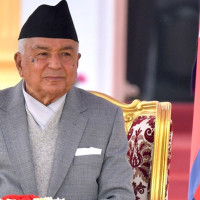- Friday, 28 November 2025
Govt will build sustainable social security system: PM
By A Staff Reporter,Kathmandu, Nov. 28: Prime Minister Sushila Karki has said that although the tenure of the current government is short, it is committed to building an integrated, sustainable and efficient social security system.
Speaking at a programme held at the Office of Prime Minister and Council of Ministers at Singha Durbar on Thursday to mark the 8th Social Security Day, Prime Minister Karki said, “In a country like ours, a contribution-based social security system is essential to maintain intergenerational cost balance and ensure fairness.”
“Only with its effective implementation can we build a productive society based on the principle of solidarity -- where the capable support the incapable, the wealthy support the poor, and the healthy support the ill,” the Prime Minister said.
She has also extended her warm greetings to everyone on the occasion of the Social Security Day. “From my long years of experience in the justice sector, I have always been familiar with the idea of social justice. However, as I take on new responsibilities in this role, I realise that social justice is not possible without a comprehensive system of social security,” the Prime Minister said.
The Contribution-Based Social Security Act, 2017, is a key component of this tripartite framework. Its effective implementation will help create an environment where every citizen can live and work comfortably within the country, and will contribute to boosting overall productivity, as highlighted in this year’s theme.
Prime Minister Karki said, “I would like to inform you that the ministers present, and I have been discussing how the issues you have raised can be addressed within the limited tenure of this government, so that we can move towards establishing an integrated, sustainable and efficient social security system.”
“Based on your years of experience, you have identified several priority issues -- such as ensuring mandatory enrolment of workers in the formal sector, defining the federal government’s financial contribution for workers in the informal sector, ensuring that contract workers under government agreements feel included in the Social Security Fund, and establishing clear guidelines for the rightful mobilisation of the Fund’s resources as internal capital,” she said.
“I assure you that we are committed to creating an environment in which these concerns can be addressed in a way that strengthens citizens’ trust and sense of belonging towards the state,” the Prime Minister said.
She also urged the private sector not to view social security for their workers as a burden but as a matter of pride. “At a time when the size of the Fund is growing rapidly, it is important to begin serious homework on how this capital can be used for building the nation. The contributions made by each worker and employer must be invested in areas that yield meaningful results,” Prime Minister Karki said.
Public media join SSF
All media outlets under the Ministry of Communications and Information Technology (MoCIT) have now been affiliated with the Social Security Fund (SSF).
On the occasion of the Eighth Social Security Day, government media outlets were affiliated with the Social Security Fund in the first phase.
In accordance with the legal provisions that require formal organisations and associations to affiliate with the SSF, government media outlets have formally joined the Fund.
A Memorandum of Understanding (MoU) for the affiliation of government media with the SSF was signed on Thursday at the Prime Minister’s Office (PMO) at the Singha Durbar in the presence of Prime Minister Sushila Karki and Communications Minister Jagdish Kharel, marking the eighth anniversary of the establishment of the Fund.
Executive Director of the SSF, Kabiraj Adhikari signed the MoU with the officials from the relevant bodies.
Among those signing the MOU were the Rastriya Samachar Samiti, Gorkhapatra Corporation, Public Broadcasting Service Nepal (PBS), Press Council Nepal, and Minimum Wage Determination Committee.
Minister Jagdish Kharel said that, although there was a law in place for government media outlets to affiliate with the SSF, they had not done so for various reasons until now. Speaking to journalists at the Ministry of Communications on Thursday, he mentioned that the affiliation marks the beginning of the inclusion of media organisations within the scope of social security.
He also added that all other bodies under the ministry would be gradually affiliated with the Social Security Fund.
"All government media outlets under the ministry have now been affiliated with the SSF. With this, journalists and employees working with government media will now come under the scope of social security. This is just the beginning, and further work will follow. We will continue to implement this for other agencies under the ministry," said Minister Kharel.
He said that all private and community media outlets registered and operating in Nepal would also be gradually affiliated with the SSF.
"The bodies signing the agreement have formulated action plans. They will decide how to include everyone under the legal provisions without any contradictions," he said.
According to the SSF, by Wednesday, 2.6 million citizens have been brought under the umbrella of social security based on their contributions. The Fund runs various schemes for workers, including medical treatment, health and maternity benefits, accident disability, family protection, and old-age security.
Workers and their families have been receiving various benefits and facilities from these schemes.
So far, the SSF has collected a total of Rs. 95.68 billion based on contributions.
A total of 253,143 workers have claimed Rs. 17.72 billion in benefits. In addition to health benefits, the Fund also provides interest on savings, monthly pensions after a certain period, home loans, and educational loans, among other benefits.














